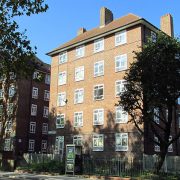In October last year, Joe Paraskeva, a 20-year-old bipolar sufferer was sectioned under the Mental Health Act and placed in the care of Homerton Hospital, in Hackney.
After two days, he became distressed and tried to get out by setting fire to a door. The hospital called the police and he was arrested, convicted of arson and sent to a Young Offenders Institution as an ordinary criminal.
Now, according to his mother, landscape gardener, Linda Morgan, she and her son are living a Kafkaesque nightmare in which, in spite of the fact that he had committed his offence while in the care of the hospital, was tried and then sentenced on the assumption that he was not mentally ill.
To make matters more confusing, although the psychiatrist had stated that he was no danger to the public, a probation officer, using a computer assessment, decided that he was indeed sufficiently dangerous to warrant incarceration for a minimum of two years with no maximum limit. He could effectively be detained for life.
Morgan said: “My son voluntarily admitted himself to the hospital, so he obviously knew he needed help. This is a person who asked for help and instead of receiving health care he was imprisoned. That to me is extraordinary.”
Paraskeva was formally diagnosed and treated for bipolar affective disorder during his teens and spent seven months in an adolescent inpatient unit where he received treatment and support for his condition.
At 18, he was transferred to adult services. According to his mother he received much less support and experienced side effects to his medication. Due to his deteriorating condition, Morgan accompanied her son to the adult psychiatric ward at the Homerton where he was subsequently sectioned under the Mental Health Act.
Frightened and distressed, he tried to escape from the wing two days later. He attempted, unsuccessfully, to burn a hole in the doors by lighting his aerosol deodorant and firing the flame towards the lock. No one was hurt and only a couple of hundred pounds’ worth of damage was caused.
Paraskeva was arrested, taken from the secure unit to a police cell and subsequently charged with arson. At his hearing at Snaresbrook court, he pleaded guilty and was given an indeterminate sentence of imprisonment for public protection (IPP), with a minimum requirement of two years in prison but no maximum limit – which means he could, depending on his behaviour, be detained for life.
The judge’s decision rests on an assessment by the psychiatrist at Homerton Hospital that Joe was not suffering from a mental illness at the time of the arson attack. His mother is confused by that conclusion, given that he had so recently been sectioned for a 28-day assessment period.
“My son was in fact sectioned under the Mental Health Act when he committed the act. Such conflicting evidence is one of the grounds for appeal. If there was any concern about his safety, he should have been kept in a more secure ward instead of just letting him to go to prison.”
Judge Pardoe’s decision to give him an indeterminate sentence was equally confusing, according to Morgan. “The doctor didn’t think there was enough evidence to show he [Joe] was dangerous,” she said. The judge’s decision that he did pose a risk to the public, was based on a risk assessment compiled by a probation officer who had not met him. The probation officer’s analysis was formed by entering facts about the case and Paraskeva’s background into a computerised risk-analysis system, which classified him as dangerous.
“The judge refused to adjourn the case until a time where a video link could be provided (since Joe was unfit to attend his sentence.) Nor did he ask the doctor, who had only met my son briefly one time, to clarify the conflicting evidence. What’s more is that we haven’t been granted leave for appeal let alone set a date yet because Joe’s sentence is indefinite. This means we may have to wait for a very long time which is extremely worrying,” says Morgan.
Her son is currently at a young offenders unit at Chelmsford, Essex, and his family is concerned about his physical and mental well being as he has lost a considerable amount of weight and is severely depressed. He will be transferred to an adult prison in September when he reaches 21.
“When I last visited him, Joe was unrecognisable. He had lost several stone and seems very traumatised. Bipolar disorder is a severe condition and if he is too depressed he won’t even go out of his cell,” said Morgan.
Mental health campaigners are appalled by the case. Marjorie Wallace, chief executive of Sane, says: “In our view this case is cruel and inhumane, yet sadly this happens all too often. Seventy per cent of prisoners have two or more psychiatric conditions. Sane questions why a young man, who is known to suffer from a serious mental illness, should be taken to prison where, because of the IPP, he could be detained for many years.
“He is being given a double penalty – a deeply debilitating illness and being treated as a criminal and not receiving the treatment he desperately needs. Had he been judged under the Mental Health Act he could receive medication and therapies, and be able to appeal to a tribunal when the symptoms of his illness were controlled.”
Wallace argues there is a need for urgent reform so that prisoners such as Paraskeva do not end up in prison. “We believe that prisons are now the ‘dumping grounds’ replacing psychiatric institutions – which have been closing by the day. Many of the old ‘asylums’ were replaced by prisons,” she adds.
Paraskeva’s lawyer, Graeme Hydari is in the process of lodging an appeal and Morgan has launched a campaign and a petition calling for: “Justice and proper health care for Joe Paraskeva.”
The petition to the Prime Minister says: “We urge you to use all the powers of your office to help secure Joe’s transfer from prison into an appropriate and supportive hospital environment where he can receive the care and treatment he sought and surely deserves and for his conviction to be overturned.”
“This online petition has already generated great support from friends, family and the public. A young man who has been diagnosed with mental health problems and has no previous criminal convictions should not be sentenced to prison. The indefinite sentence is a draconian conviction that will ruin Joe’s life. I find it ridiculous how a mentally ill patient,who tried to escape from a psychiatric ward, is treated as a criminal. He doesn’t need punishment; he needs help,” says Morgan.
Diane Abbott MP, Hackney North and Stoke Newington told the Hackney Gazette: “It is really important that these campaigners have their voice heard.
“The case is complex, but the questions raised by his apparently harsh treatment by the criminal justice system feed into an ongoing debate on how offenders with mental health problems should be dealt with.”
The government t is planning a radical reform of the sentencing and prison system to divert mentally ill patients from prison. Says Morgan, “We have received a lot of support from MPs. Justice Secretary, Kenneth Clarke has recently proposed that mentally ill people should not be in prison. How will they achieve this when the justice system is sending them to prison?”
Morgan said if 5,000 people sign the petition her campaign will get a response from the government and 100,000 signatures would mean the case would be eligible to be discussed in Parliament. The petition closes on Wednesday, August 31.
Morgan is also urging people to send postcards about her son’s case to the Prime Minister. They are available from the family’s local newsagents Hamdy’s in Stoke Newington High Street where a window display has been created to draw attention to the case.
A bank account will be opened to help support the campaign and EastLondonLines will provide details when they are available.
For further information, please visit:http://www.justiceforjoe.org.uk/






I am deeply disturbed by Joe Paraskeva’s situation. There is so much that is wrong about this case. Joe being able to get hold of a lighter whilst under a mental health section, with all the bizarre and unjust twists of the judicial system and IPP sentence he has received. He is a young man in desperate need of treatment and mental health support. He is obviously not a criminal and therefore should not be in prison. I think that not only is this very worrying for Joe and his family but for the wider public too, especially as one in four people suffer from some mental health illness during a life time. I believe that Joe should be immediately transferred to a psychiatric unit so he can be cared for properly, receiving the appropriate treatment.